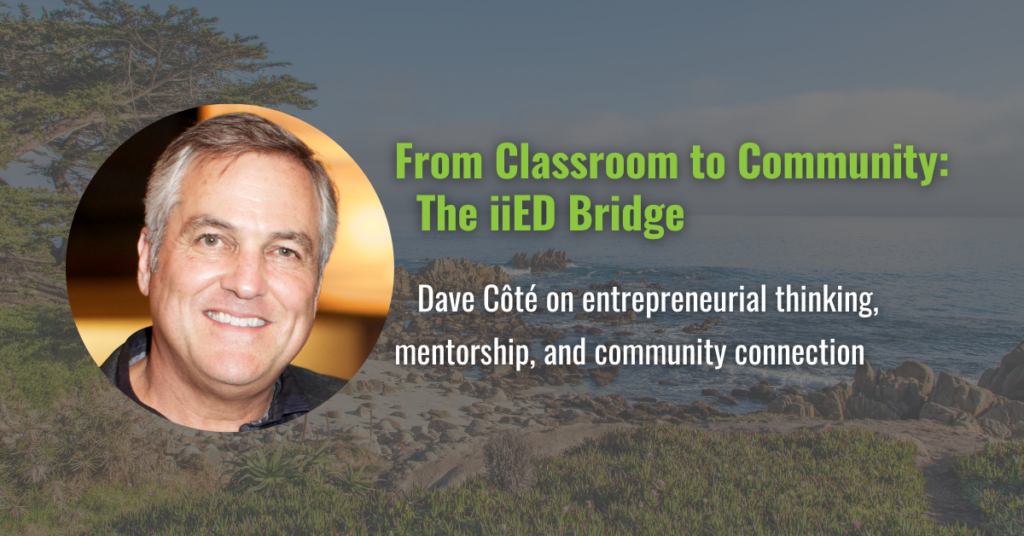
Dave Côté on entrepreneurial thinking, mentorship, and community connection
Institute for Innovation and Economic Development (iiED) Advisory Board Member Chair Dave Côté is passionate about bringing entrepreneurial thinking to all areas of study— and life.
“Wherever you are, you’ve got to be able to embrace change, to bring new ideas to whatever it is that you’re doing,” he said. “Applying entrepreneurial ideas, whether that’s risk-taking or innovation or whatever it might be, I think is critical to pushing the envelope in whatever it is that you’re doing.”
Côté, who has over 25 years of experience in startups and publicly traded companies, became chair last year. The Silicon Valley Startup veteran is now focused on working with students, and other participants in iiED’s programs, such as Startup Challenge and Launchpad.
“I was on the advisory council and involved in fundraising for iiED fairly early on,” he said. “I have a background in tech and in small companies and entrepreneurship. I do a little bit of investing, but not much. I wouldn’t consider myself an angel investor. I do a few things and I advise a couple of companies.”
Côté’s Startup Background
Prior to his successful tech and entrepreneurial career, Côté studied Zoology at Davis and completed an MBA with a marketing and finance emphasis at CSU Sacramento. After graduation he went into sales, quickly realized it was not for him, and returned to marketing.
“I got recruited to Apple, which happened to be across the street from where I was working. And that was the only reason I went to the interview. This guy says, ‘Hey, invest an hour and come over. It’s a 10-minute walk.’ I was there for nearly 10 years in the eighties, all in marketing.”
After serving as Director of Marketing at Apple for several years, Côté went to work at networking company Synoptics until many of the marketing team were let go as a result of a company merger.
Côté decided to take a chance on a startup and began working at ZeitNet, Inc., holding the title of Vice President of Communications and Customer support. Two years later he worked at IDT as General Manager and Vice President of Worldwide Marketing.
In 2002, Côté became CEO of the Packeteer, an IT company based in Cupertino. During his time as CEO, the company grew from 40 to 150 million. After selling the company to Blue Coat, Côté took a year off startup life to work at a winery.
Since then, Côté has held multiple positions. including CEO & President at Symmetricom, Chairman of the Board of Directors at Wave Systems Corp, and Advisory Board Member at Promio.io.
In January 2018, Côté became a member of the Business Advisory Council at the College of Business at CSUMB. Four years later, he was asked to chair iiED’s Advisory Board, which he accepted.
The Joy of Advising
As a member of the advisory council, Côté said his most rewarding work is interacting with the students and participants in IIED programs.
“Whether being a judge or mentoring students, that process is very gratifying. But on a more day-to-day personal note, just the participation in programs and, being a coach, being a judge, being a mentor, and watching the development of these people and what they’ve done is pretty exciting. And it’s really probably the most gratifying thing.
According to Côté, participating in iiED on an advisory level has opened his eyes to the talent pool of excited, talented young entrepreneurs, who are searching for work that requires their specific skills.
“There’s a lot of work we have to do to take advantage of some of these bright, brilliant people who’ve been willing to offer their time in a variety of different ways, he said. We have to figure out how to best take advantage of the talents that they want to provide. And no shortage of excitement and interest in what iiED is trying to do. So that’s good.
Côté thinks students of all majors would benefit from a required entrepreneurial course.
“The idea of entrepreneurship and understanding innovation is a critical skill,” he said. There should be an entrepreneurship opportunity for anybody. If I’m a marine science major, I have to be introduced to entrepreneurial concepts because that may in fact affect how I think about whatever it is I do in marine sciences, as an example. We’re not there yet, but it is something I think the institute thinks about.”
The iiED Bridge
In addition to providing critical entrepreneurial skills to CSUMB students, Côté praises iiED for bridging the gap between the university and the Monterey Bay region.
“It’s mostly about giving those students who have an interest in entrepreneurship an opportunity to really focus on it, learn techniques, and in some cases through the (Startup Monterey Bay) programs. This is where you start to see it step into the community.”
Côté sees iiED as offering students the unique experience of working through the experience of building an actual business, then bridging the connection to the community through iiED’s Startup Monterey Bay programs, such as Startup Challenge.
iiED is an institute of the College of Business of CSUMB that is dedicated to creating a sustainable entrepreneurial regional ecosystem throughout the Central Coast. Through its programs, iiED supports students and community members to start and grow new businesses, providing mentorship, workshops, connections, and networking opportunities along the way.
The Institute runs several entrepreneurial programs throughout the year. Startup Factory invites students and the community to form teams and build a business over a weekend. Startup Challenge is an annual competition for new businesses that teaches, coaches, mentors, networks, and connects entrepreneurs to the knowledge and resources they need to succeed in the marketplace.
Startup founders searching for continued support can apply to Startup Launchpad— an ongoing, application-based program that offers mentoring and advising, access to workshops, referrals to resources, assistance in obtaining funding, and connections to iiED’s vast network.
For those looking to network and keep up with regional entrepreneurship and startup news, Monthly Startup Monterey Bay Connect meetings provide a space to learn about businesses in the area and connect with like-minded entrepreneurs, as well as potential mentors and investors.
These programs, according to Côté, provide a crucial connection between the school and community, as well as create a sustainable entrepreneurial ecosystem.
“Through iiED’s programs, students can try out a new business idea and build a business and see how that works,” he said. “By doing that and engaging the community in that, now you’re helping the economic development of the tri-county area and the entire Central Coast. And in helping those businesses to be able to take advantage of a growing infrastructure in the area that’s supportive of startups.”
Côté has participated in Startup Challenge as a judge on numerous occasions, and appreciates how all the divisions play an important role in the growth of the regional economy. Venture startups have the potential to grow into national companies, while Main Street businesses play a vital role in the community. Both are critical to the region and to the environment the Institute is trying to create.
“On the one hand, you hope the venture start-ups like Joby Aviation and Apostrophe build their businesses here in the region, but Mainstreet Businesses, providing local tourism, artisan foods, local services represent a breadth of entrepreneurship hare in the region”
These are equally as important for the vitality of the community because you hope that you do enough to build infrastructure to help the venture startups to stay in the area and they then drive employment and further innovation. While Mainstreet businesses can take advantage of the same infrastructure for their success and employees.”
According to Côté, creating a startup supportive culture is even more important in Monterey than nearby Santa Cruz, where people can more easily commute to Silicon Valley.
“Santa Cruz in some ways maybe has a stronger entrepreneurial startup culture because of how closely connected to the valley it is,” he said. “That’s a little tougher when you’re in Marina, you’re in Salinas, you’re in Monterey. That culture is a little deeper there, but the idea is the same, which is how do you support people who are trying to start new businesses?”
Côté sees iiED as having one foot in the university and one in the community.
“CSUMB is the only business school here and CSUMB understands that it is a regional state university that has a high degree of responsibility to help their local community,” he said. “You just look at the demographics, the number of low-income people, first time college goers— these are huge percentages of people that are getting opportunities through CSUMB that they might not get in other places.
“If the community’s vibrant, the university’s more vibrant. And so there is a huge symbiotic relationship between the economic community and success of the central coast.”


